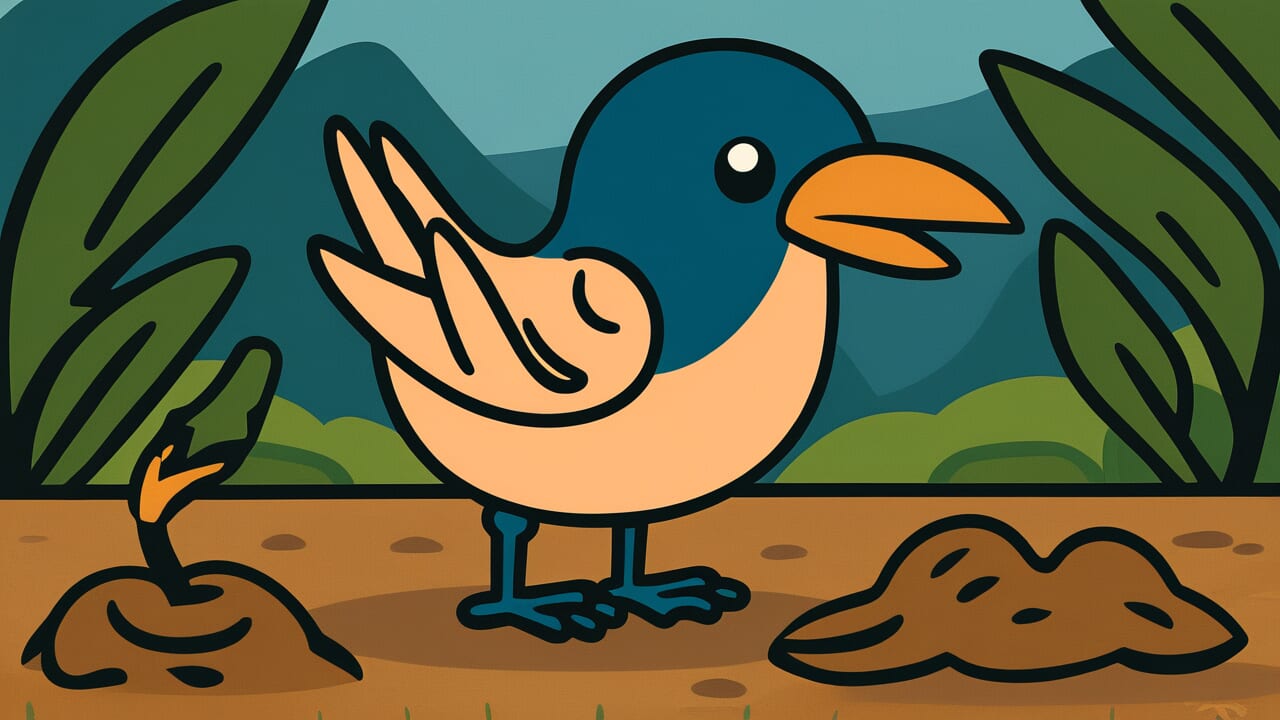How to Read “the early bird catches the worm”
“The early bird catches the worm”
[THUR-lee BURD KACH-iz thuh WURM]
All words use standard pronunciation.
Meaning of “the early bird catches the worm”
Simply put, this proverb means that people who act quickly and prepare early get the best opportunities.
The saying uses a simple image from nature. Early morning birds find more worms because they search before other birds wake up. The message goes much deeper than hunting for food. It teaches us that timing matters in almost everything we do.
This wisdom applies to many parts of modern life. Students who start projects early often get better grades. Job seekers who apply first have better chances. Shoppers who arrive early find the best deals. The pattern stays the same across different situations.
What makes this saying powerful is how it captures a basic truth about competition. Good opportunities don’t last forever. Someone else will take what you want if you wait too long. The proverb reminds us that success often depends on being ready to act.
Origin and Etymology
The exact origin of this proverb is unknown, but similar sayings appeared in English writing during the 1600s. Early versions focused on the idea that early action brings rewards. The specific “early bird” phrase became popular in American English during the 1800s.
This type of wisdom mattered greatly in agricultural societies. Farmers knew that timing determined success or failure. Planting too late meant smaller harvests. Markets rewarded those who arrived first with fresh goods. These daily realities shaped how people thought about opportunity.
The saying spread through common speech and written collections of proverbs. It appeared in newspapers, advice books, and school lessons. The simple bird image made it easy to remember and teach to children. Over time, it became one of the most recognized sayings in English.
Interesting Facts
The word “early” comes from Old English meaning “soon” or “in good time.” Birds actually do catch more worms in early morning because worms come to the surface when the ground is cool and moist. This proverb uses alliteration with “early” and “bird,” making it easier to remember and more pleasant to say.
Usage Examples
- Manager to employee: “If you want that promotion, start arriving before everyone else – the early bird catches the worm.”
- Parent to teenager: “The best summer jobs get filled in March – the early bird catches the worm.”
Universal Wisdom
This proverb reveals a fundamental tension in human nature between comfort and opportunity. Our brains naturally prefer rest and routine over the uncertainty of early action. Yet we also understand that the best rewards go to those who overcome this natural resistance.
The wisdom touches on something deeper about how resources work in any competitive environment. Whether it’s food, jobs, or relationships, the most desirable options get claimed first. This creates a constant pressure between our desire to wait for perfect conditions and our need to act before others do. Early action often means accepting some risk and discomfort in exchange for better chances.
What makes this pattern universal is how it reflects the basic structure of opportunity itself. Good things are usually limited in some way. The best parking spots get taken first. The most talented people get hired quickly. The most attractive partners don’t stay single long. This scarcity means that hesitation often costs more than imperfect action. Our ancestors observed this pattern in hunting, farming, and trading. We see the same dynamics in modern careers, investments, and relationships. The underlying truth remains unchanged across time and culture.
When AI Hears This
This saying hides how success often depends on invisible advantages. People with money don’t worry about losing jobs for arriving late. They can afford to take risks on early opportunities. Meanwhile, others work night shifts or care for family members. The “lazy” person might actually have fewer choices about their schedule. We praise early birds but ignore why some people can’t fly.
Humans love this story because it makes success feel fair and earned. It suggests anyone can win by just trying harder. This belief protects us from seeing uncomfortable truths about inequality. We’d rather think winners deserve their rewards than admit the game isn’t equal. The proverb lets society feel good about uneven outcomes. It turns structural problems into personal moral lessons.
What fascinates me is how this myth actually serves everyone’s needs perfectly. Winners get to feel virtuous instead of lucky about their advantages. Losers get hope that effort alone can change their situation. Society avoids hard questions about fairness and access. Even though the belief isn’t quite true, it keeps people motivated. Sometimes a beautiful lie works better than an ugly truth.
Lessons for Today
Living with this wisdom means recognizing that preparation and prompt action create their own advantages. The challenge isn’t just waking up early or moving fast. It’s developing the mindset that sees opportunity as something to pursue rather than wait for. This requires building habits that support quick decision-making and early preparation.
In relationships and work, this wisdom suggests paying attention to timing and readiness. People who prepare for opportunities before they appear often seem “lucky” to others. They’ve simply positioned themselves to act when the moment comes. This might mean learning skills before you need them, building relationships before you need help, or saving money before you need to spend it.
The deeper lesson involves balancing urgency with wisdom. Being early doesn’t always mean being first to act on every opportunity. Sometimes it means being first to recognize which opportunities matter most. The most successful people often combine the early bird’s timing with careful judgment about where to focus their energy. This wisdom works best when it guides preparation and awareness, not just speed. Understanding that good opportunities have natural limits helps us make better choices about when to act quickly and when to wait for something better.



Comments